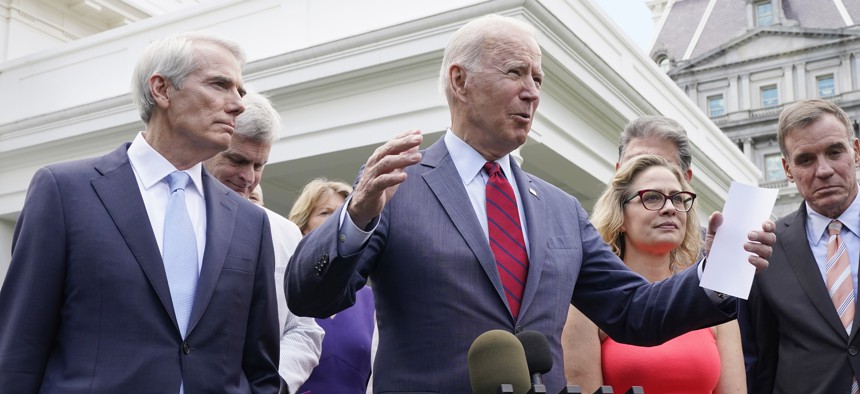Biden: 'We Have a Deal' on $1.2T Infrastructure Plan

President Joe Biden, with a bipartisan group of senators, speaks Thursday June 24, 2021, outside the White House in Washington. Biden invited members of the group of 21 Republican and Democratic senators to discuss the infrastructure plan. AP Photo/Jacquelyn Martin
A bipartisan group of senators emerged from a meeting at the White House Thursday to announce they had secured an agreement to invest $1.2 trillion in the nation’s infrastructure over eight years.
President Biden announced agreement Thursday on an infrastructure proposal brokered by a bipartisan group of senators—but he vowed not to sign any legislation unless it was accompanied by a second package addressing domestic priorities.
“We have a deal,” said Biden, who was joined outside the White House by five Democratic and five Republican senators who helped broker the proposal. “We made serious compromises on both ends.”
The proposal includes $579 billion in new spending that invests heavily in transportation infrastructure but also includes funding for broadband, water and power grid systems and resiliency, according to a fact sheet issued by the White House. Overall spending detailed in the plan would total $973 billion over five years and $1.2 trillion if extended to eight years.
The agreed-upon plan is far smaller than Biden’s initial $2.3 trillion infrastructure plan, and does not include investments in education, workforce development and child care that were part of a second White House proposal—the American Families Plan.
In a separate press conference held after the announcement, Biden said Congress would also have to make earnest progress on the domestic priorities included in the American Families Plan.
“We need physical infrastructure but we also need human infrastructure as well,” he said.
If only the infrastructure plan and not the latter domestic plan advances, “I’m not signing it,” Biden said.
The infrastructure package includes $312 billion in transportation funding, including $109 billion for roads and bridges, $66 billion for railways, $49 billion for public transit, $20 billion for airports, $16 billion for ports and waterways, and $7.5 billion each for electric vehicle infrastructure and electric bus fleets. Other infrastructure investments include $73 billion for power grid systems, $65 for broadband, $55 billion for water systems, and $47 billion for resiliency efforts.
“We’ve agreed on the price tag, the scope, and how to pay for it,” said Sen. Susan Collins, Maine Republican, calling it the largest infrastructure proposal in history.
Sen. Rob Portman, Ohio Republican, noted that no one got everything they wanted, but he added that no new taxes would be enacted to pay for the investments.
Information provided by the White House provides a broad list of ways the proposal will be paid for but does not include detailed figures. Proposed financing sources include reducing the IRS tax gap, public-private partnerships and asset recycling, and using unspent pandemic relief funds including unspent unemployment insurance.
One progressive nonprofit group was critical of the proposal’s reliance on privatization schemes—including public-private partnerships, private activity bonds and asset recycling.
“Privatization is nothing more than an outrageously expensive way to borrow funds, with the ultimate bill paid back by households and local businesses in the form of higher rates,” said Mary Grant, the director of Food and Water Watch’s Public Water for All initiative. “The most sensible infrastructure solution is to provide robust public funding for publicly owned projects, which would discourage price gouging by corporate interests, protect public control over these precious assets, and save everyone money.”
Other groups questioned exactly how the money would be spent.
“We can spend $500 billion well, or we can spend it poorly. Right now, all we’ve got is a price tag, and that doesn’t tell us a whole lot,” said Steve Davis, a spokesman for Transportation for America. “At this point, people are celebrating a handful of senators coming together on an agreement to spend money. That seems premature.”
Lawmakers announced Wednesday night that they reached a “breakthrough” agreement for the framework of the infrastructure bill.
Neither Senate Majority Leader Chuck Schumer nor House Speaker Nancy Pelosi endorsed the negotiated plan outright, saying they would wait to see the full details of the proposal.
“We’ll let them announce it first, but let's see,” said Schumer, joined by Pelosi as the two made brief remarks about the negotiations. “But we support the concepts we have heard about.”
Andrea Noble is a staff correspondent with Route Fifty.
NEXT STORY: Bipartisan Group of Senators to Meet with Biden on ‘Breakthrough’ Infrastructure Agreement





